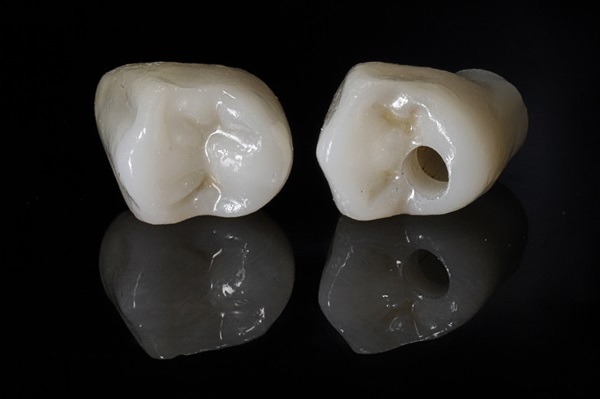Types of Dental Crowns: Which One is Right for You?

When it comes to restoring damaged or weakened teeth, dental crowns provide an effective and lasting solution. Dental crowns are custom-made caps placed over a tooth to restore shape, size, strength, and appearance. Understanding the different types of dental crowns available can help patients make informed decisions about their dental care.
Types of dental crowns
Porcelain crowns
Porcelain crowns are crafted entirely from ceramic material and are renowned for their natural appearance. They closely mimic the color and translucency of natural teeth, making them an excellent choice for restoring front teeth where aesthetics are a primary concern. Porcelain dental crowns are also biocompatible, making them less likely to cause allergic reactions or gum irritation. However, they may not be as strong as metal-based crowns and can be more susceptible to chipping or cracking under heavy biting forces.
Porcelain-fused-to-metal (PFM) crowns
PFM crowns offer a balance between strength and aesthetics. They have a metal substructure covered with a porcelain overlay, providing durability along with a tooth-like appearance. The metal core offers robust support, making these crowns suitable for both front and back teeth. A potential drawback is that, over time, the metal may become visible at the gum line as a dark line, especially if gum recession occurs. Additionally, there is a risk of the porcelain chipping off the metal framework.
Gold crowns
Gold crowns contain gold alloy mixed with other metals to enhance strength and durability. They are highly wear-resistant and do not fracture or chip easily, making them ideal for molars and patients who grind their teeth. Gold dental crowns require the least amount of tooth removal and are gentle on opposing teeth. Despite their advantages, their metallic color makes them less desirable for visible areas, and they can be more expensive due to the cost of gold.
Zirconia crowns
Zirconia crowns contain zirconium dioxide, a durable and aesthetically pleasing ceramic material. They offer the strength of metal crowns with the appearance of porcelain crowns. Zirconia dental crowns are resistant to fracture and can withstand substantial chewing forces, making them suitable for any location in the mouth. They also cause minimal wear on opposing teeth and can be shaped and colored to match surrounding teeth. One consideration is that they may be more opaque than other ceramic crowns, which could be a concern for front teeth restorations.
Factors to consider when choosing a dental crown
- Aesthetics: For highly visible teeth, crowns that closely resemble natural teeth, such as porcelain or E-Max crowns, are preferable.
- Biocompatibility: Patients with metal allergies or sensitivities should consider metal-free options like porcelain or zirconia crowns.
- Cost: The choice of material can significantly affect the cost, with gold and all-ceramic crowns typically being more expensive.
- Durability: For molars and premolars that endure significant chewing forces, stronger materials like gold or zirconia crowns may be more suitable.
- Longevity: While all crowns are designed to be durable, materials like gold and zirconia may offer longer-lasting results.
- Tooth Preservation: Some crowns require more tooth reduction than others; for instance, gold crowns require less removal of tooth structure.
Consult a dentist about dental crowns today
Dental crowns not only restore the functionality of teeth but also enhance the overall appearance of the smile. Understanding the differences between the types of dental crowns can empower patients to make informed choices about their oral health care. For more information, schedule a consultation visit today at Turlock Dentistry And Implants.
To schedule a consultation, request an appointment on our website at https://www.turlockdentistry.com or call Turlock Dentistry And Implants at (209) 667-5405 for an appointment in our Turlock office.
Check out what others are saying about our dental services on Yelp: Dental Crowns and Dental Bridges in Turlock, CA.
Related Posts
If you are dealing with a damaged tooth, dental crowns may be a viable solution. These tooth coverings help restore a damaged tooth for a functional and healthy smile. While a crown is one of the most common types of dental work, it still may not be for everyone. It can only be used to…
CEREC® crowns are a great dental restoration option that offers convenience, ease, and efficient results. However, they are still rather new to dentistry, which can cause those that are considering their options to have a lot of questions. CEREC® crowns achieve the same goal as traditional crowns do, but the way the process is executed…
A dental bridges is a method of teeth replacement that involves the attachment of a dental crown (or multiple dental crowns that form a bridge) and abutment teeth. An implant-supported bridge may also be an option, which is a bridge supported by implants rather than natural teeth. Regardless, keeping the dental bridge clean is essential. Patients…
When a person has a missing tooth, one of the quick and affordable options they might consider is a dental bridge. Missing teeth affect daily dental functions and social interactions. This article covers what a dental bridge is, how it works, and how a bridge addresses a gap in the smile due to missing teeth.A…
